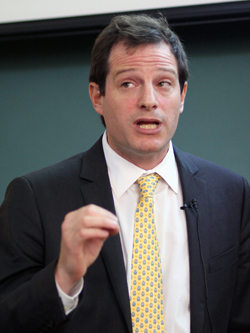Scott Straus, an Associate Professor of Political Science at the University of Wisconsin-Madison and winner of the 2006 Award for Excellence in Political Science and Government, began his career as a journalist covering wars and uprisings in Africa.
When he arrived at a concentration camp in Rwanda, he saw a mass grave of women and children, a scene that inspired his academic career as a scholar of war and mass killing in Africa.

Straus discussed how the history of war and violence has not been unique to Africa, but more so to areas in Asia and the Middle East.
“Violence is fundamental to Africa’s post-colonial political history, but it is not unique to just Africa,” Straus said during his Wednesday lecture. “Africa is not more prone to mass atrocities when compared to Asia and the Middle East.”
Thirty African states (or 65 percent) have experienced some form of war since the end of colonialism. The vast majority were civil wars within those states, including 17 different conflicts in the early 1990s.
“Africa has been vulnerable to the onset of wars, but they are not necessarily longer or more brutal wars,” Straus said.
Straus also told the packed Lovell Lecture Room crowd that the wars in Africa are changing. Smaller insurgencies now develop in regional areas across the continent and in sparsely populated areas that have little to no government control.
“So many states have conditions that favor insurgency, especially weak governments and rough, mountainous terrain,” Straus said.
The military groups are primarily criminal organizations that are focused on running guns, drugs, and kidnapping, he said. Other types of small criminal organizations are focused on abducting children to force them into soldiering or warring over Africa’s vast mineral resources.
There are other areas in the world that have more “wars,” which are defined as 25 or more deaths per year between two world groups, specifically in Middle Eastern Asia. Militia and anti-government groups have accounted for most of these “wars.”
Ethan Hollander, Assistant Professor of Political Science, said Straus was selected by the Lecture Planning and Implementation Committee. Hollander said Straus’ visit to the College was to provide the campus with a more knowledgeable understanding of what has been taking place in Africa. As of now, the College does not have an African-based political science course.
“On a collegiate level, I have long been an advocate of paying more attention to Africa,” Hollander said. “I think Africa is underappreciated in a sense — not enough people focus on it and if they do, they focus on the wrong text. By having this lecture, students are able to get a glimpse of the underlying truths about Africa.”
 Straus discussed how the history of war and violence has not been unique to Africa, but more so to areas in Asia and the Middle East.
Straus discussed how the history of war and violence has not been unique to Africa, but more so to areas in Asia and the Middle East.